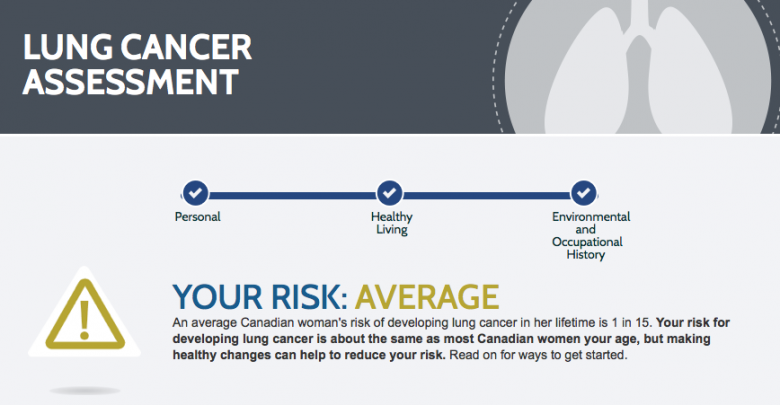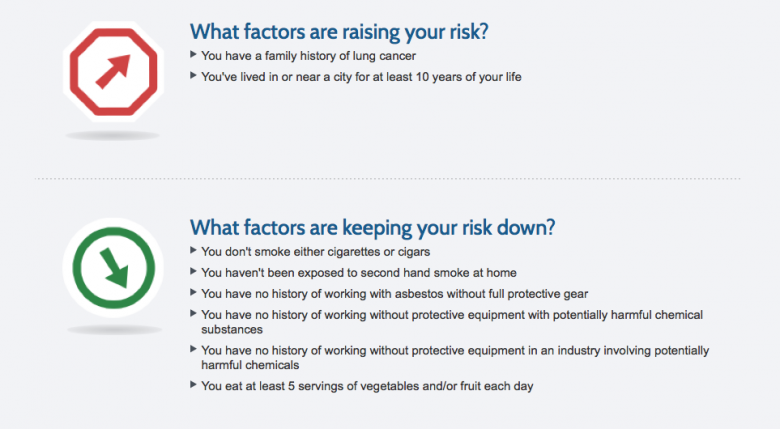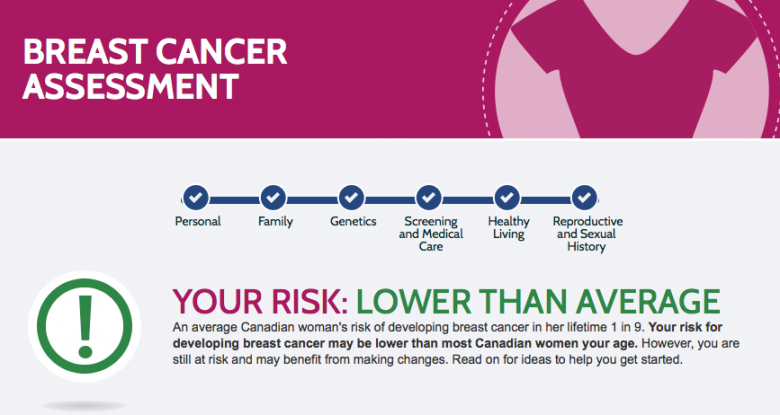Written by Brandie Weikle
It’s not much fun to contemplate our risks for cancer. If you’ve lost a family member to any form of the disease, the thought may be doubly frightening.
But information is power. In fact, research shows that as many as half of cancers could be prevented if people had taken steps to eliminate known risk factors. In 2013, there were 72,000 new cases of cancer diagnosed in Ontario alone. (Can you imagine if 36,000 of those people and their families were spared the pain and stress of a cancer diagnosis?) And of course getting informed about our risks can encourage us to seek routine screening that can lead to early detection, increasing our odds of survival if it turns out we do have cancer.
So when Cancer Care Ontario came to UrbanMoms.ca to tell us about a new online screening tool that helps assess cancer risk, I decided to overcome the queasy feeling I get when I think about cancer and give the tool a try.
My Cancer IQ includes four interactive questionnaires that calculate the user’s personalized risk for breast cancer, cervical cancer, colorectal cancer and lung cancer. Each takes about 10 minutes to complete. The site then provides recommendations and resources for eliminating or at least lowering the risk factors it helps you to identify.
Because my maternal grandmother succumbed to breast cancer and my father to lung cancer, despite being an active non-smoker, I decided to fill out the questionnaires for those two diseases.
Breast cancer was the most frequently diagnosed cancer in Ontario women in 2012, but as this tool shows, there are many things you can do to help decrease your risk, including maintaining a healthy body weight, exercising regularly and consuming six or fewer servings of alcohol each week.
I was surprised by some of the things I learned just from answering the survey questions, because for each one there’s the option of hitting a link that says “Why is this important?”
For example, I hadn’t realized that early onset menstruation (defined as under the age of 15!) may increase your risk due to the length of time one spends with elevated estrogen. Same with weighing more than average (8.5 pounds) at birth and with being tall (I guess that’s one thing in favour of being a short woman like me). Of course these things, along with having a family history or carrying either of the breast cancer BCRA1 or BRCA2 gene mutations, are entirely beyond our control, unlike the lifestyle factors that can help us dramatically reduce our risk.
In the end, despite having lost a grandmother to the disease, I was happy to find myself assessed at lower than average risk due to things like being active, maintaining a healthy bodyweight, being relatively young when I had my first child and breastfeeding for more than one year.
Lung cancer is the most common cause of cancer-related deaths and the third most commonly diagnosed cancer in Ontario. It’s a tough diagnosis, but luckily there’s still a lot you can do to prevent the disease, the most obvious among them being a non-smoker, but less obvious perhaps, eating five or more fruits and vegetables each day.
Because of my family history and the fact that I have lived in a city of at least 100,000 for 10 years or more, which is considered long-term exposure to air pollution, my risk of lung cancer was assessed as average, despite being a non-smoker. On the other hand, lowering my risk are the fact that I’ve haven’t been exposed to second-hand smoke at home (unlike my father, whose parents were both heavy smokers), having no history of working with harmful chemicals and eating a plant-rich diet.
After I completed each questionnaire I received recommendations for lowering my risk factors, tailored to my results. It took just a few minutes to complete each one and in the end I found the information really useful and even comforting.
 This post was brought to you by Cancer Care Ontario, but the opinions and observations are my own. For more information, please visit www.mycancerIQ.ca.
This post was brought to you by Cancer Care Ontario, but the opinions and observations are my own. For more information, please visit www.mycancerIQ.ca.



Nothing can lower your risk of cancer. A very recent study revealed that cancer is pure chance and lifestyle choices have very little to do with it. Hence the reason everything in the past decade has been related to cancer, Because it is random. Good luck and sleep tight.